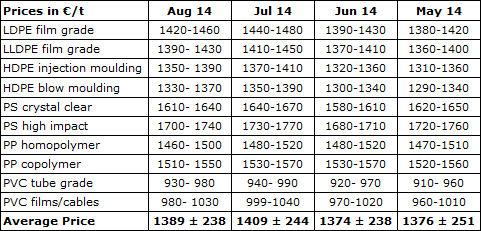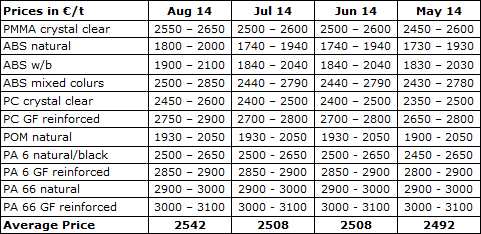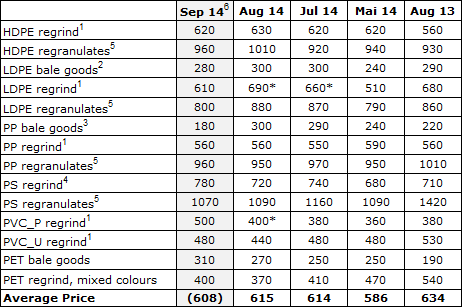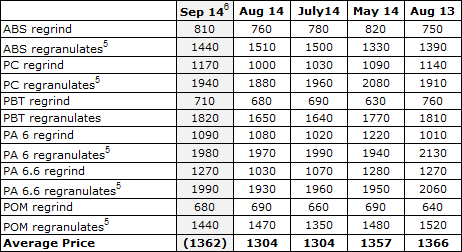Market Report Plastics - September 2014
Information about the market for plastics is being presented by:
bvse - Bundesverband Sekundärrohstoffe und Entsorgung e.V.
1. The market for primary plastics
The less positive news from the German economy is that the ifo Business Climate Index for Germany’s trade and industry has dropped to 104.7 points in September. This is the lowest value since April 2013. The current business situation has, once again, been assessed as being slightly less favourable than in the previous month. The expectations for the next six months fell to the lowest level since December 2012. The German economic engine has slowed down.
The good news from the plastics industry comes from KI – Kunststoffinformation, see. After a very strong start into the year 2014, the German plastics processing industry swung back into a solid growth course in the second quarter. Overall, the industry, which attained a production value of € 12.5 billion from April to June 2014, reached an exceptional 2% increase compared to the same period of the previous year, which was already positive at that point. At the end of the first half-year, a 5.3 % rise was recorded, i.e. the increase attains € 28.3 billion including the extraordinarily successful first quarter. This is shown by the figures published by Germany’s Federal Statistical Office with reference to the specialised business segments that are directly concerned with Germany’s plastics processing.
Standard plastics: In August standard plastics prices fell, see Table 1. Average prices dropped by 20 €/t compared to the previous month. PE plastics fell by 20 €/t, PS by 30 €/t, PP by 20 €/t and PVC by 10 €/t. Packaging PET, which attained an average 1270 €/t, fell by 25 €/t relative to the previous month. This price fall is explained by demand, which was considerably lower during the summer holidays, thus leading to a price reduction in precursors. As early as at the end of August and at the beginning of September plastics processors have come to raise their purchasing quantities again.
Table 1: EUWID quotes for standard plastics over the past four months; prices in €/t.

Technical plastics: Technical plastics prices, which are quoted in EUWID every two months, see Table 2, rose by an average 34 €/t in August. While the PMMA price went up by 50 €/t, ABS by 60 €/t and PC by 50 €/t, POM and PA held their own. In this area, too, the demand for technical plastics was low in July and August as a result of the summer holidays. There is considerable supply of technical plastics. While plastics producers are hoping for prices to increase, processors are waiting for the last price rises to be reversed.
Table 2: EUWID quotes for technical plastics, published every two months, over the past six months; prices in €/t.

2. The market for secondary plastics
The good news for plastics recyclers is that recyclates continue to be in great demand. Regrind and regranulates are holding their own. Recyclates, which are a very advantageous supplement to primary goods, are stabilising the primary markets. The bad news is that there is, once again, a shortage of waste plastics. Or to put it differently, there are not enough processing goods at a quality that may be viewed as being at least “sufficient”. At present plastics processors in Germany are, once again, losing large quantities of input materials through the export trade with the Far East. Large quantities of waste plastics are being withdrawn from Europe, especially from France, Italy, the United Kingdom and Germany, due to the exports to the Far East. At present there is considerable export demand for film in particular.
While standard plastics prices rose in the primary markets in August, plastics prices in the secondary markets, see EUWID and plasticker, more or less held their own. In August the situation in the processing industry was slightly calmer as a result of the summer holidays. In August and September in particular there has been considerable demand for HDPE, PP and PS waste plastics among purchasers. Plastics recyclers are thus reacting to the increasing outflow of waste plastics to the Far East by purchasing goods from very diverse sources. The supply of plastics recyclers with separated plastics fractions from waste packaging is being effected relatively inefficiently.
2.1 EUWID Price Watch
The EUWID Price Watch for waste plastics only showed few price changes in August. While PVC and PS held their own, there were slight price changes in the PE and PP quality grades. Film was affected by almost all of the price changes.
As far as post-industrial PE is concerned, LDPE film natural (K 40) is quoted at 510-620 €/t: thus attaining a 10 €/t rise in the lower price range. In the case of post-user PE LDPE shrink film natural (E 40) is listed at 520-570 €/t, film transparent natural<70 m at 420–465 €/t and HDPE hollow bodies mixed colours (C 29) at 190-320 €/t, which means their prices have risen by 10 €/t in the lower price range. Film transparent mixed colours <70 m is quoted at 420-465 €/t, involving a 20 €/t rise in the higher price range. Mixed film 80:20 is quoted at 260–280 €/t and mixed film 90:10 at 270–310 €/t, meaning that their prices have increased by 10 €/t and 15 €/t respectively. Mixed film 98:2 attained record prices in August.
As far as post-industrial PP is concerned, film mixed colours (K59) has fallen slightly by an average 5 €/t, which means it is now quoted at 130-240 €/t, while the price of film natural (K50) has risen by an average 5 €/t, attaining 330–470 €/t.
The PET market was relatively calm in August, too. As a result of the summer break, beverage bottle supply slightly increased. There is considerable demand for PET flakes. According to EUWID, PET beverage bottle prices continued to hold their own in August. The EUWID quotes for beverage bottle PET have still remained unchanged at: PET transparent 250-290 €/t and PET coloured 60-95 €/t.
2.2 plasticker price index
The plasticker internet platform publishes quotes on an hourly basis. However, the present market report indicates the final monthly prices. The preliminary quotes previously accumulated are only represented during the reporting month in question, in this case for September 2014 - these quotes thus merely reflect an interim situation that does not become definitive until the following month.
Standard plastics
In August the average price for standard plastics in Table 3 remained unchanged compared to the previous month. Nevertheless, there are, in part, significant price changes in the individual quality grades. For instance, price rises range from 10 €/t to 90 €/t and price falls from 20 €/t to 70 €/t. In August there was low demand for standard plastics due to the summer break. PS regranulate prices have been declining for four months. HDPE regranulates were in great demand in August, thus attaining their highest quote in eleven months. PET regrind completely bottomed out in August. According to plasticker the listing changed by more than +/- 40 €/t compared to the previous month for: HDPE regranulates + 90 €/t and PS regranulates – 70 €/t.
The first preview of the September quotes, which cannot be finally reported until the beginning of October, shows the prospective average price to be 608 €/t. Thus, the plasticker internet platform showed a slight price fall by 7 €/t on 12 September 2014. There has been considerable demand for plastics in September up to now.
Table 3: Standard plastics prices in plasticker; quoted in €/t.

*: Supply figures too low to attain statistical significance; 1: equivalent to the grade “post-industrial, mixed colours”; 2: equivalent to K49; 3: equivalent to K59; 4: equivalent to “standard, mixed colours”; 5: equivalent to the grade “regranulates, black”, 6: forecast (may be amended by additional quotes)
Technical plastics
In August the average technical plastics price remained unchanged compared to the previous month, see Table 4. There were only slight changes in the individual quality grades; for instance, price rises ranged from 10 €/t to 120 €/t and price falls from 10 €/t to 40 €/t. The POM regranulate price was raised by 120 €/t. There was low demand for technical plastics in the holiday month of August. According to plasticker the following listings changed by more than +/- 70 €/t - with the exception of POM regranulates, whose price changed by +120 €/t. Technical plastics could be purchased at very favourable prices in August.
The first preview of the September quotes, which cannot be finally reported until the beginning of October, shows the average price to be 1362 €/t. Thus, technical plastics prices have risen markedly. To date, there has been considerable demand for technical plastics in September.
Table 4: Prices of technical plastics in plasticker, quoted in €/t

5: equivalent to the grade "regranulates, black". 6 forecast (likely to be amended by additional quotes)
No guarantee for any of the prices. All EUWID prices are quoted ex works. As a rule, the prices quoted refer to quantities in excess of 20 tons. The monthly quotes for secondary plastics, which are updated on an hourly basis, can be calculated using the price lists that are derived from the quotations published in the raw material exchange plasticker. The prices listed in this index are quoted with reservation - as the majority of the quotes submitted are not necessarily equivalent to the sales prices. Furthermore, plasticker does not distinguish between the following grades: transparent, mixed colours or colour-separated. Therefore, the information provided by plasticker may indicate different market behaviour than the prices quoted by EUWID. Plasticker offers the quality grades regrind and regranulates in the form of both virgin materials and secondary materials.







